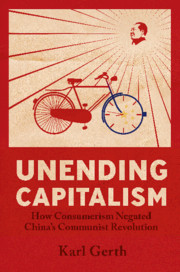Book contents
- Unending Capitalism
- Unending Capitalism
- Copyright page
- Contents
- Figures
- Acknowledgments
- Abbreviations
- Introduction
- Chapter 1 Self-Expanding and Compulsory Consumerism
- Chapter 2 Building State Capitalism Across 1949
- Chapter 3 Soviet Influences on State Consumerism
- Chapter 4 State Consumerism in Advertising, Posters, and Films
- Chapter 5 State Consumerism in the Service Sector
- Chapter 6 Consumerism in the Cultural Revolution
- Chapter 7 The Mao Badge Phenomenon as Consumer Fad
- Afterword
- Notes
- Bibliography
- Index
Chapter 1 - Self-Expanding and Compulsory Consumerism
Published online by Cambridge University Press: 08 May 2020
- Unending Capitalism
- Unending Capitalism
- Copyright page
- Contents
- Figures
- Acknowledgments
- Abbreviations
- Introduction
- Chapter 1 Self-Expanding and Compulsory Consumerism
- Chapter 2 Building State Capitalism Across 1949
- Chapter 3 Soviet Influences on State Consumerism
- Chapter 4 State Consumerism in Advertising, Posters, and Films
- Chapter 5 State Consumerism in the Service Sector
- Chapter 6 Consumerism in the Cultural Revolution
- Chapter 7 The Mao Badge Phenomenon as Consumer Fad
- Afterword
- Notes
- Bibliography
- Index
Summary
Chapter 1 provides an accessible introduction to the book’s argument. It examines the self-expanding and compulsory aspect of industrial capitalism and its natural correlate, industrial consumerism, by tracing how Chinese people competed to produce and acquire consumer goods across the Mao era, 1949–76. In the 1960s, consumers demanded three luxury products in particular: wristwatches, bicycles, and sewing machines, known at the time as the Three Great Items. Before the late 1950s, all three of these had been difficult to acquire. As the state continued to expand control over both production and consumption, the Three Greats became increasingly available across cities, towns, and even some rural areas. By the end of the Mao era, so many people already owned these three that industrial consumerism began to replace these with more technologically complex and capital-intensive consumer products, initiating another round of compulsory and self-expanding consumerism.
Keywords
- Type
- Chapter
- Information
- Unending CapitalismHow Consumerism Negated China's Communist Revolution, pp. 10 - 40Publisher: Cambridge University PressPrint publication year: 2020



